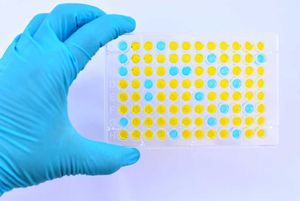About This Program
This program aims to develop Ang-2 & VEGF therapeutic bispecific antibody for immuno-oncology.
Angiogenesis, VEGF, angiopoietin (Ang) 1, and Ang2, are the factors regulating tumor angiogenesis. Inhibition of the VEGF pathway is known to have good anti-tumor effects in many tumors. But efficacy is not universal. In some cases, such as brain tumors, this pathway fails to improve overall survival.
Studies have shown that combining Ang-2 with VEGF may have strong vascular changes. The bispecific antibody, Ang-2 & VEGF, can also be used in combination with chemotherapy or radiation therapy. In conclusion, the combination of anti-Ang-2 / VEGF-A proposes a new outlook to next-generation combination therapy strategy.
Ang-2 & VEGF
VEGF is a key driver in germination angiogenesis and is known to be overexpressed in most solid cancers. Angiogenesis has been characterized as a fundamental process of tumor cell proliferation and viability, which has led to the development of pharmacological agents for anti-angiogenesis to disrupt vascular supply and starve tumors of nutrients and oxygen, primarily by blocking VEGF/VEGF receptor signaling.
Ang-2 participates in the resistant pathway of anti-VEGF therapy in the preclinical model of Glioblastoma (GBM). Ang-2 binds to the TEK receptor tyrosine kinase (Tie-2) receptor. And in the physiological setting, Ang-2 inhibits Tie-2 signaling, destabilizes blood vessels and promotes VEGF-induced angiogenesis. Ang-2 mediates Tie-2+ macrophage homing to human GBMs. In TME, the macrophage population is then reprogrammed into a promo, proangiogenic phenotype, in an Ang-2 dependent manner.
Learn more: Next-IO™ Ang-2 & VEGF Therapeutic Bispecific Antibody Program
